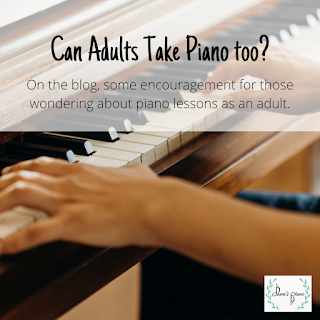Can Adults take Piano too?
A lot of my marketing tends towards lessons for children (which is mostly just because they go in for brag photos more than adults do). And while childhood piano lessons are a big focus of the studio, we also have at least half a dozen adult learners on the roster at any one time. And because I believe playing piano is valuable and beneficial at any age, I'd love to start to see more adults giving it a try! So I wanted to use this first blog post of 2023 to make known some of the offerings this studio has for adult students. If you've been curious about starting piano lessons, or perhaps encouraging a friend or family member to look into it, let this be your motivation to get started.
Am I too old to learn?
Perhaps you've always wanted to play piano, but never had the opportunity to start. I'm here to assure you that it's not too late. Currently my oldest student is in their late 70's! If you're feeling hesitant though, this article about the joy of being an adult beginner is a great place to find some motivation to go ahead and try a new thing. For myself, I started taking beginning ballet classes in my late 20's and continued for about 7 years. I loved it, and will definitely continue when I have the opportunity again. I know first-hand the joy of being an adult beginner at something that is often seen as a discipline for children. I know too that it can feel awkward and a little vulnerable at times. But I like to remember that we don't get as many of those 'joy of discovery' moments when we're grown, so creating an opportunity for ourselves to have them is a wonderful form of self-care.
Playing piano is also good for cognitive health. If it's good for growing brains, it's also good for grown-up brains. And as we age, giving our minds a chance to forge new neural connections and find novelty in new skills is a great way to stave off senility and promote cognitive health. Piano is one of those activities that involves the whole brain because we use the right and left brain in tandem. So whether you're dusting off your skills from some long-ago childhood lessons, or starting as a brand new beginner, piano lessons are a great resource for promoting cognitive heatlh.
So how do adult piano lessons work?
With all of my students, I work to find music they'll love and customize their curriculum to their interests and goals. When you start piano lessons, we'll talk about those goals. I might ask questions like:
- When you think of yourself 'playing the piano', what do you see?
- Are you playing just for yourself? Is the family gathered around? Are you in a band? Are you at home? Or out in the community? At a gig or church?
- What kind of music are you interested in learning?
- Is there a special goal piece you'd like to work towards?
What if my schedule doesn't have room for a weekly lesson?
For adult students, I offer two options for tuition. One is the regular monthly flat rate which reserves a weekly lesson time and includes all your books & materials, the other is a punch-card. Punch cards can be purchased in 5 or 10 lesson packages, and while they do not include books & materials, they do offer you the flexibility to schedule lessons when you're ready for them.
So whether you want a guaranteed weekly bit of 'me-time' at the piano, or prefer to fit in lessons where you can around a busy work and family schedule, you have options, and I'm always open to chat.
While I recognize that I am TOTALLY biased, I think I can still truthfully say that learning to play the piano is valuable at any age.
